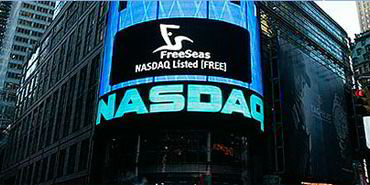The Nasdaq-listed stock topped out at around $0.60 following a 13.45% spike in the hours following the opening bell before losing steam.
Earlier in the day the shipowner announced a deal in which Hanover Holdings, a fund controlled by a Manhattan-based alternative investment firm called Magna Group, agreed to acquire $10.5m worth of outstanding debt tied to Deutsche Bank Nederland.
When pen meets paper the lender will be poised to recoup roughly $0.30 on the dollar after taking a $20m haircut as it intends to forgive the remainder of the company’s unpaid loans, according to securities filings.
In exchange for its role in the settlement Hanover will receive shares of common stock it intends to sell over time to cover an investment that appears to have been in the works for some time.
"After a prolonged period of tortured uncertainty we are particularly pleased to enter into this agreement, which will remove approximately $30m of secured debt from our books,” said chief executive Ion Varouxakis in a statement Wednesday.
“In conjunction with action taken since the beginning of the year, the majority of our trade debt and a third of our bank debt will have been exchanged for equity upon completion of this agreement.”
Varouxakis hopes the development will “accelerate” similar discussions with other lenders like Credit Suisse and The National Bank of Greece, which inherited FreeSeas debt after absorbing former compatriot First Business Bank.
When the Handover deal is sealed management says the Athens-based operator’s bank debt will have been reduced from approximately $89.2m to $59.7m and note two of its seven vessels will emerge debt free.
Going forward Varouxakis tells TradeWinds his company intends to seek funding for additional working capital in an effort to ensure stability during the market downturn and the final stages of its financial restructuring.
In its most recent annual report FreeSeas warned investors about non-compliance with various covenants even though it had successfully amended two loan facilities.
Like many of its cash-strapped peers the company blamed three years of consecutive losses on the downturn in the dry-bulk market caused by the glut in global fleet capacity and the subsequent decline in vessels values and freight rates.
You can read more about the terms of the deal by clicking on the link to FreeSeas' latest SEC filing under the Related Media section to the right




